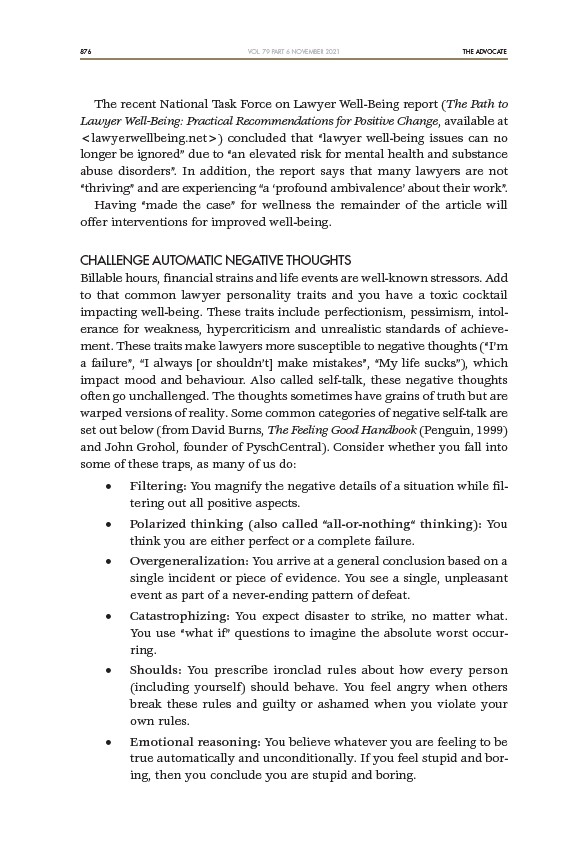
876 THE ADVOCATE
VOL. 79 PART 6 NOVEMBER 2021
The recent National Task Force on Lawyer Well-Being report (The Path to
Lawyer Well-Being: Practical Recommendations for Positive Change, available at
<lawyerwellbeing.net>) concluded that “lawyer well-being issues can no
longer be ignored” due to “an elevated risk for mental health and substance
abuse disorders”. In addition, the report says that many lawyers are not
“thriving” and are experiencing “a ‘profound ambivalence’ about their work”.
Having “made the case” for wellness the remainder of the article will
offer interventions for improved well-being.
CHALLENGE AUTOMATIC NEGATIVE THOUGHTS
Billable hours, financial strains and life events are well-known stressors. Add
to that common lawyer personality traits and you have a toxic cocktail
impacting well-being. These traits include perfectionism, pessimism, intolerance
for weakness, hypercriticism and unrealistic standards of achievement.
These traits make lawyers more susceptible to negative thoughts (“I’m
a failure”, “I always or shouldn’t make mistakes”, “My life sucks”), which
impact mood and behaviour. Also called self-talk, these negative thoughts
often go unchallenged. The thoughts sometimes have grains of truth but are
warped versions of reality. Some common categories of negative self-talk are
set out below (from David Burns, The Feeling Good Handbook (Penguin, 1999)
and John Grohol, founder of PyschCentral). Consider whether you fall into
some of these traps, as many of us do:
• Filtering: You magnify the negative details of a situation while filtering
out all positive aspects.
• Polarized thinking (also called “all-or-nothing“ thinking): You
think you are either perfect or a complete failure.
• Overgeneralization: You arrive at a general conclusion based on a
single incident or piece of evidence. You see a single, unpleasant
event as part of a never-ending pattern of defeat.
• Catastrophizing: You expect disaster to strike, no matter what.
You use “what if” questions to imagine the absolute worst occurring.
• Shoulds: You prescribe ironclad rules about how every person
(including yourself) should behave. You feel angry when others
break these rules and guilty or ashamed when you violate your
own rules.
• Emotional reasoning: You believe whatever you are feeling to be
true automatically and unconditionally. If you feel stupid and boring,
then you conclude you are stupid and boring.